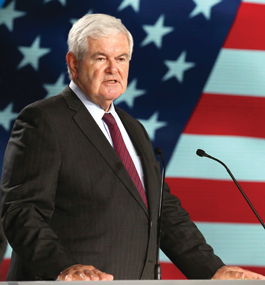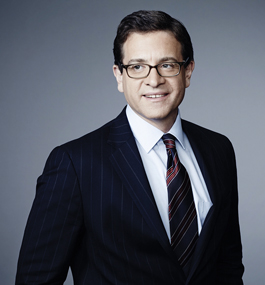When Partisanship Got Polarized
A Q&A with the author of a new book about the rise and lasting influence of Newt Gingrich.

Zakaria Abdelkafi/Getty Images
Newt Gingrich
by Jarret Bencks
In 1984, Newt Gingrich, Republican from Georgia, a backbencher in the U.S. House of Representatives, wasn’t getting the attention of his party’s leadership. But he had an idea.
C-SPAN was a sleepy nonprofit cable channel that had launched five years earlier. Though few people watched it, it was broadcasting congressional proceedings in their entirety. So at the end of every day, Gingrich took to the floor of Congress not to propose legislation, but to accuse Democrats of corruption in front of the C-SPAN cameras. Sometimes he attacked fellow legislators by name and asked them to respond.
If you were watching C-SPAN, you noticed the lack of response. But what you couldn’t see was that the House chamber was entirely empty.
During one such speech, Speaker of the House Tip O’Neill insisted that the camera pointed at the podium pan the deserted chamber. Gingrich seized the moment to argue the speaker was violating the rules, calling it further proof the Democrats were corrupt. After O’Neill responded a few days later in a speech of his own, Republicans said the speaker was out of order and had his remarks stricken from the record.
No legislation was passed, but Gingrich got what he wanted: All the major TV networks were covering his dispute with O’Neill.
Julian Zelizer ’91, a professor of history and public affairs at Princeton, a CNN political analyst and a contributor to NPR’s “Here & Now,” is the author of “Burning Down the House: Newt Gingrich, the Fall of a Speaker and the Rise of the New Republican Party.” The book, published in July by Penguin Random House, focuses on Gingrich’s successful teardown of O’Neill’s successor, Speaker Jim Wright, another Democrat.
Zelizer says the C-SPAN story exemplifies how Gingrich practiced politics: whipping up enough confrontation to turn any disagreement into “a national story, because Gingrich believed that’s how the media operated. The more conflict he gave them, the more attention he got.”
Here, Zelizer discusses why looking back at Gingrich’s ascension is still so relevant today.
Why a book about Newt Gingrich? And why now?
When I started working on this book in 2014, I was interested in writing a history of how the Republican Party had changed in dramatic ways: how it viewed governing, how it viewed partisanship and how that contributed to the current state of affairs in Washington. I always knew Gingrich was a very important figure in that change. And so I wanted to figure out a way to capture what he did, how he did it and the implications.
The story about his bringing down House Speaker Jim Wright is a real turning point, when politics moved his way rather than another way. Everyone writes and talks about polarization, and why Washington’s become so toxic, but we don’t have a history of that. Who are the key figures? What were the landmark moments? This is my effort to cover all that.
Jim Wright succeeded O’Neill in 1987 as speaker of the House and resigned two years later amid an ethics investigation. Why is Wright’s resignation such an important event in modern American political history?
Wright was the first speaker to resign, which makes it an important event in the history of Congress. But the resignation also marks the beginning of an era of instability and volatility in the internal life of Congress.
Also, this was the moment Newt Gingrich became a power broker in the Republican Party. He moves from being seen as a political bomb-thrower, a Joe McCarthy kind of figure, to being part of the Republican leadership. He’s elected minority whip. And this led us toward the road we are on today. His style of politics has now been accepted as effective.

Julian Zelizer ’91
page 2 of 2
Where do you see Gingrich’s style of politics at work?
We have unrestrained partisanship without any guardrails. You can do anything to your opponents, say anything about your opponents. You can take any basic process of government and use it for partisan war.
All this is right out of Gingrich’s playbook. He argued Republicans had to prioritize partisanship above all else. They didn’t have to balance that with the needs of governance. They didn’t have to balance that with the health of our democratic institutions. Gingrich said, “Put all that aside.” This is very much what you see in Republican politics today.
A lot of what Gingrich did was done under the guise of rooting out corruption. Do you think he ever really believed he was doing that?
I think he believed what he said. At some level, he internalized the argument that he was a warrior against political corruption. The thing is, he didn’t live by those principles at all. He was constantly being charged with pretty serious ethical violations as he was accusing Democrats of being unethical. He never insisted on any kind of purity within his own party when it had power. And so even if, on some level, he believed what he was saying, there’s a certain sadness to this, because he didn’t practice what he preached.
When Gingrich became speaker after the 1994 Republican takeover of Congress, the Republicans accelerated many of the worst trends we had seen, like money in politics and lobbying in politics. There was no effort to cleanse the system.
Did Gingrich influence Donald Trump?
President Trump is the ultimate practitioner of Gingrich politics. He is willing to say all sorts of things that are considered out of bounds in legitimate politics. He’s willing to politicize every single element of the executive branch for his purposes. He’s very much, even though he himself might not think this, a protégé of Newt Gingrich.
